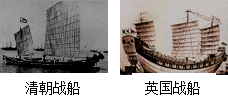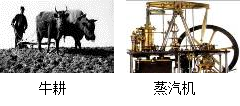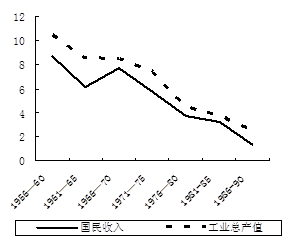(14分)历史上不同国家和地区的社会经济发展,共同推动了人类文明的进步。某班同学围绕人类社会经济发展模式这一主题展开研究性学习。
探究一 盛世唐朝
“是时,海内富实,米斗之价钱十三。青、齐间斗才三钱。绢一匹,钱二百。道路列肆,具酒食以待行人。店有驿驴,行千里不持尺兵。”
——《新唐书·食货志》
“求珠驾沧海,采玉上荆衡;北买党项马,西擒吐蕃鹦;炎洲布火浣,蜀地锦织成;越婢脂肉滑,奚僮眉眼明;通算衣食费,不计远近程;经游天下遍,却到长安城。”
——元稹《估客乐》
唐朝首都长安是一座约100多万人口的大城市,宽阔的大道纵横交错,大道上时常挤满了波斯人、印度人、犹太人、亚美尼亚人和各种中亚人。
——斯塔夫里阿诺斯《全球通史》
(1)根据材料说明唐朝农耕经济繁盛表现在哪些方面?(2分)
探究二 如图,西方崛起


(2)观察上图两组中外对比图片你有哪些认识?(2分)结合所学,分析鸦片战争后中国传统经济结构发生了怎样的变化?(3分)
探究三 如图,斯大林模式
1913—1937年苏联工业总产值在欧洲和世界的位次
| 1913 | 1928 | 1932 | 1937 | |||
| 世界 | 世界 | 世界 | 欧洲 | 世界 | 欧洲 | |
| 工业总产值 | 5 | 5 | 3 | 2 | 2 | 1 |
| 机器制造业 | 4 | 4 | 2 | 1 | 2 | 1 |
| 拖拉机 | 无 | 4 | 2 | 1 | 2 | 1 |
| 联合收割机 | 无 | 4 | 2 | 1 | 1 | 1 |
| 煤炭 | 6 | 6 | 6 | 3 | 3 | 2 |
| 电力 | 15 | 10 | 7 | 4 | 3 | 2 |
| 石油 | 2 | 3 | 2 | 1 | 2 | 1 |
| 钢铁 | 5 | 5 | 5 | 4 | 3 | 2 |
| 水泥 | 6 | 8 | 7 | 5 | 4 | 3 |
| 机床 | 无 | 12 | 6 | 5 | 2 | 1 |


(3)运用材料并结合所学,说说斯大林模式对苏联经济的影响。(4分)
探究四 民族复兴
1978年以来,中国改革开放30年所取得的辉煌成就,奏响了中 * * 伟大复兴的序曲。“中国模式”的成功,带来了中国的发展,使世界重新认识了中国。
到2050年,中国很可能成为全球第一大经济体。中国需要一个新的经济奇迹——而且全球经济兴衰可能取决于中国是否能再创奇迹。
——美国《时代周刊》
(4)阅读材料,结合所学知识说说十一届三中全会以后,中国的经济体制改革是怎样逐步深入的?(3分)
(1)表现:农业发达,物资充足;南北经济往来频繁,商业贸易蓬勃发展;长安成为闻名中外的大都会。(2分)
(2)认识:工业革命后,西方资本主义工业崛起;中国落后于世界发展潮流。(2分)
变化:①耕与织的分离,纺与织的分离农产品的日益商品化;小农经济开始解体;中国逐渐被卷入资本主义世界市场。②洋务企业的产生。③外国资本主义企业的产生。④中国近代民族资本主义的产生。(3分)
(3)影响:①苏联社会主义建设取得重大成就,形成比较齐全的工业体系,基本实现工业化;工业生产总值跃居欧洲第一,世界第二。②但超越生产力发展水平:优先发展重工业,使农业和轻工业长期落后;人民生活水平提高缓慢;农民生产积极性不高;长期僵化执行计划性指令,阻碍苏联经济的进一步发展。(4分)
(4)农村实行家庭联产承包责任制;城市进行国有企业改革;建立社会主义市场经济体制。(3分)
题目分析:(1)结合材料信息“海内富实,米斗之价钱十三。青、齐间斗才三钱。道路列肆,具酒食以待行人。店有驿驴,行千里不持尺兵。”反映农业、手工业、商业发展。“经游天下遍,却到长安城。”反映贸易发展、频繁。
“唐朝首都长安是一座约100多万人口的大城市,宽阔的大道纵横交错,大道上时常挤满了波斯人、印度人、犹太人、亚美尼亚人和各种中亚人。”反映长安城当时的地位。
(2)两组图片的对比反映的是中国农耕文明和西方工业文明的差异。注意从两个角度分析鸦片战争后中国经济结构的变化:一是自然经济的解体:耕与织的分离,纺与织的分离,农产品的日益商品化;二是近代工商业在中国的兴起和发展;外商企业、洋务企业、民资资本主义企业的相继出现。
(3)结合所学知识一分为二的分析斯大林模式的利弊。利:苏联社会主义建设取得重大成就,形成比较齐全的工业体系,基本实现工业化;工业生产总值跃居欧洲第一,世界第二。弊:优先发展重工业,使农业和轻工业长期落后;人民生活水平提高缓慢;农民生产积极性不高;长期僵化执行计划性指令,阻碍苏联经济的进一步发展。
(4)从三个角度把握中国经济体制改革的进程:农村从人民公社体制到家庭联产承包责任制;城市从单一的公有制经济到扩大企业自主权,实行多种所有制成分并存;经济体制从计划经济体制到市场经济体制。
点评:本题的关键在于运用辩证观点,保证答案的全面性,防止片面性。对有些认识、评论之类的答案,要从正反两方面考虑,切忌全面肯定或全面否定。
